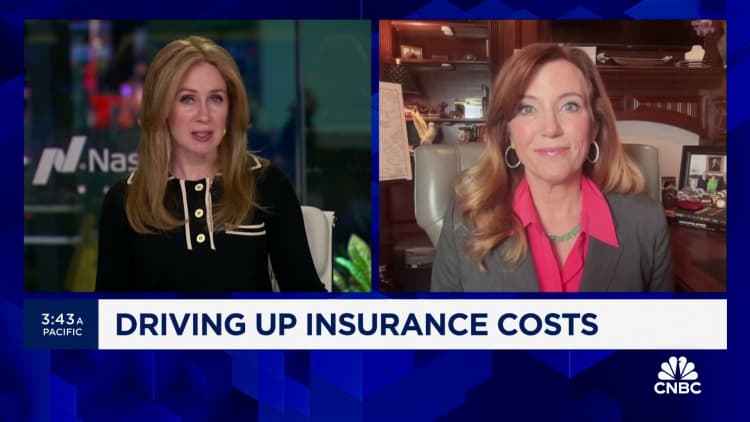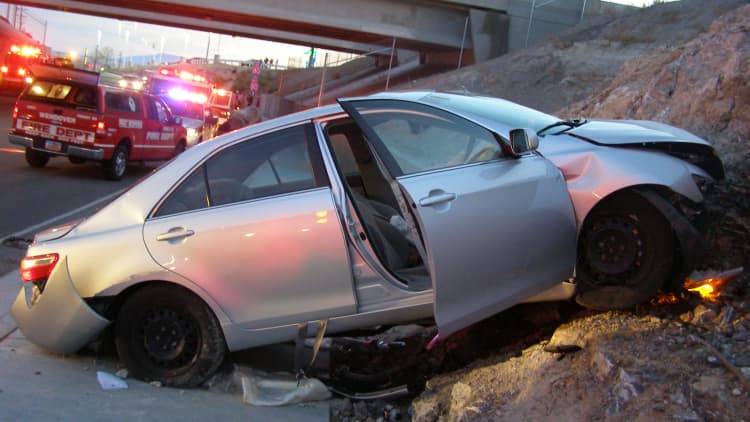
New cars today are loaded with high-tech features for car shoppers, from their own operating systems to navigation and remote unlock.
But with those advancements come questions about driver privacy, said Ivan Drury, the director of insights at Edmunds, a car site.
“As much advancement as we have when it comes to new features, many of them are data dependent,” he said, whether it’s through a computer that is built into the car or a GPS service on your phone that connects to your car systems.
Almost every new vehicle collects different types of details about you — and they will share and sell that data, according to a September report by Mozilla, a data privacy advocate, which looked at the privacy practices of 25 different car brands.
More from Personal Finance:
New, used car prices are cooling. Here’s what shoppers can expect
Will 2024 be a good time to buy a car? Here’s what to expect
How to find an inexpensive new vehicle
Most of the reviewed brands, 84%, share personal data with service providers, data brokers and other parties not named, the report found. About 76%, or 19 of the consulted brands, said they sell customer data to third parties.
Only two car brands currently allow users to delete their personal data, Mozilla found: Renault and Dacia.
“This is still kind of the ‘Wild, Wild West’ of data collection and aggregation,” said Theresa Payton, the founder, president and chief executive officer of Fortalice Solutions, a cybersecurity advisory firm.
“There are several challenges that remain in place for consumers,” she said, as drivers try to find the best car that fits within their budgets and their own privacy concerns.
To be sure, data collected by cars nowadays may not be too different from that shared from the “cellphones already in our pocket,” said Tom McParland, a contributing writer for automotive website Jalopnik and operator of vehicle-buying service Automatch Consulting.
Said Drury: “Think about how you use your phone. There’s a lot of stuff that people don’t realize that they’ve already given up when it comes to data.”
While it remains to be difficult to do your own research, there are three steps car shoppers can take as they assess potential new cars, experts say.
1. Ask about data privacy at the dealership
Once you narrow your options down to a specific vehicle, the first thing you can do is talk to the dealership and see what insight they can give you on that brand’s data collection practices, experts say.
You can ask representatives at the dealership about a carmaker’s privacy policies and if you have the ability to opt-in or opt-out of data collection, data aggregation and data monetization — or the selling of your data to third-party vendors, said Payton.
Additionally, ask if you can be anonymized and not have the data aggregated under your name and your vehicle’s unique identifying number, she said.
People at the dealership “might even point you towards talking to the service manager, who often has to deal with any repairs and any follow up and technical components,” said Drury.
“Your service provider or the service adviser is actually going to have a little more insight versus the salesperson,” he said.

2. Talk to your auto insurance provider
It may also be worthwhile to ask your auto insurance provider about car data collection, said Drury. Auto insurers may be receiving data of this nature as automakers share or sell it.
While people at the dealership will have some knowledge on a specific vehicle, the insurance provider might give a better holistic view of it because they’re covering many different makes and models, he said.
“I’d ask the insurance company, ‘Are you using this and do you have an option to opt in or opt out different devices to monitor,'” said Drury.
3. Periodically wipe your car’s onboard computer
These days, many newer vehicles essentially have an onboard computer. If you don’t want to be tracked or have vehicle data collected and shared, you might find instructions in your owner’s manual on how to wipe out your personalized data and information from the onboard computer, said Payton.
“That can be a great way if you are already in a car and you love the car, but you don’t like the data tracking,” she said.
While you may not know if the data was already collected and sent out to third parties, you could do this on a periodic basis, she said.
Some separate online tools might also help: An online resource called Privacy4Cars can help users delete personal data stored by automakers, including text messages and geolocations, Payton said.
“They are providing this tool to help users understand the data their cars collect and to give them an option to safeguard their privacy,” she said.
Why removing a car’s computer might not work
In a recent episode from The New York Times’ “The Daily” podcast, a woman paid a mechanic $400 to remove the device in her vehicle that provided internet connectivity. She essentially disconnected her car to eliminate its ability to share her location, and in the process, lost features like navigation services and the ability to call roadside assistance.
While it may be possible to isolate and remove a car part or chip like this, you can’t just rip out a CPU of a car, said McParland.
“Almost everything nowadays is going to have these integrated systems,” he said.
Drury agreed: “These systems are so integrated with everything that your vehicle’s doing. [The] sensors … that help with [a] vehicle’s semi-autonomous features, those are wired to your throttle, to your steering, to your breaks. It can be extremely dangerous for somebody to go around there and start unplugging things.”
Drivers can always tap into the older, used car market to find a vehicle without high-tech features, but such cars might have their own risks the older they are, said McParland.
Additionally, the car’s onboard computer can provide a lot of safety features like car alerts, said Payton: “If you were to ostensibly turn off the onboard computer, you might miss out. It’s finding that right balance, it’s a risk versus reward.”
Read More: World News | Entertainment News | Celeb News
CNBC










